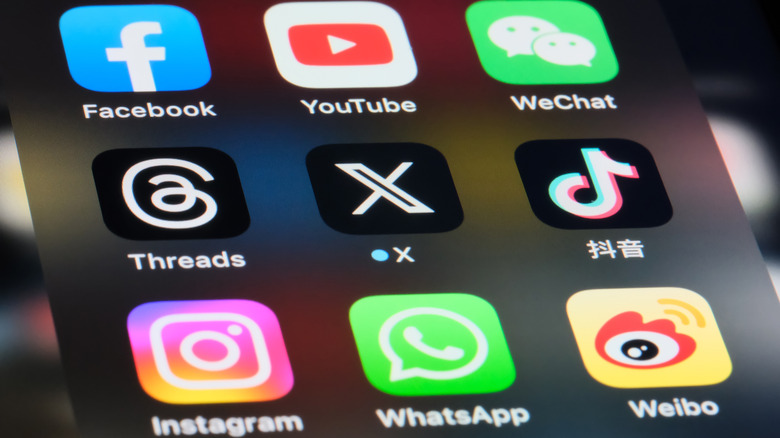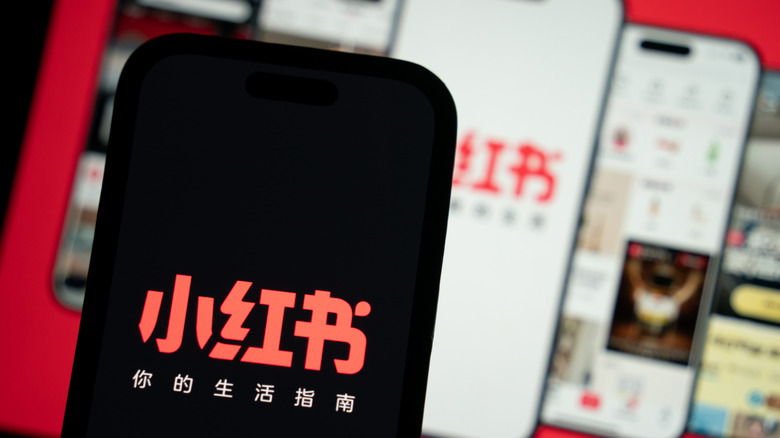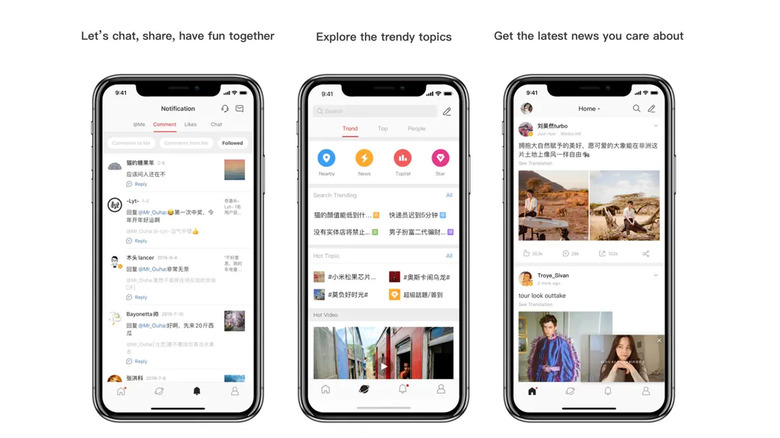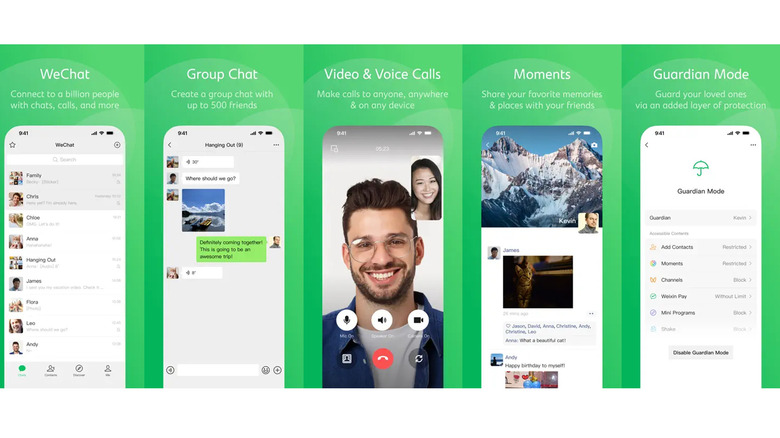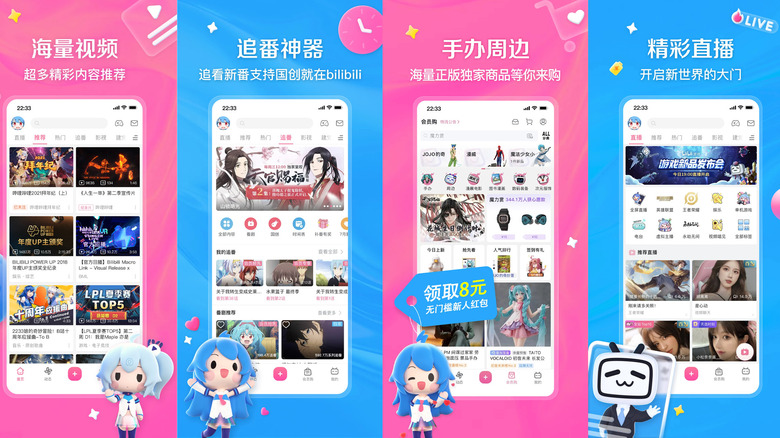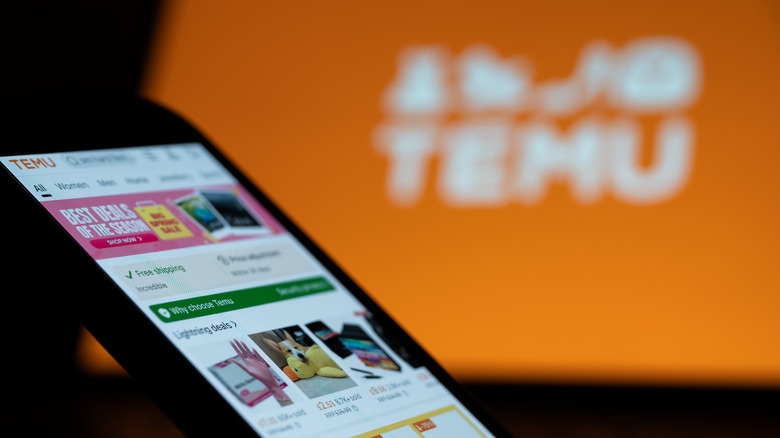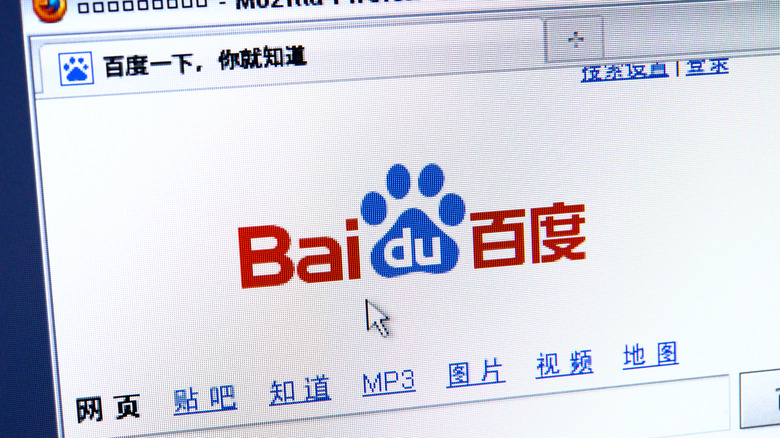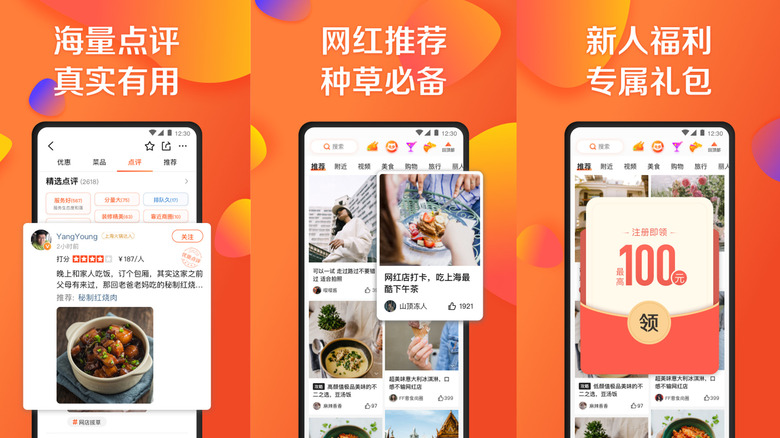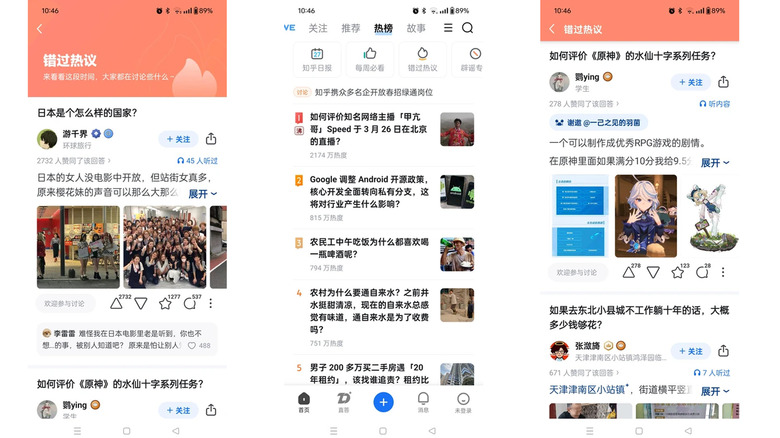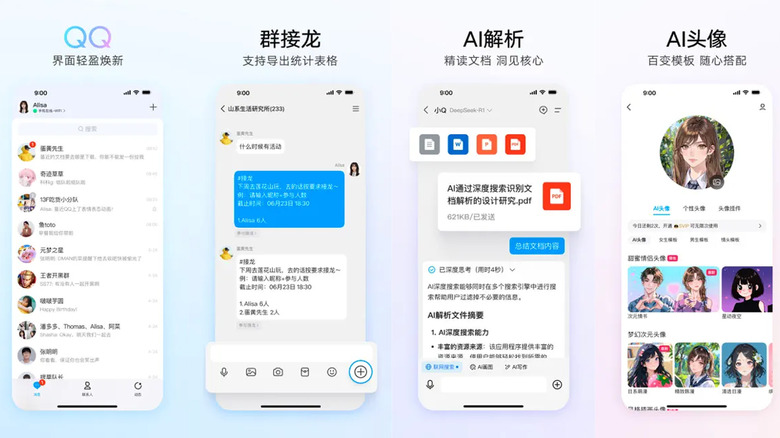10 Popular Chinese Apps (And Their Western Equivalents)
When it comes to apps that run daily life, most people immediately think of Western giants like Instagram, Google, or WhatsApp. But in China, there's a completely different digital universe. It's packed with feature-rich super-apps, wildly creative platforms, and shopping tools that seem to offer everything under the sun, and then some. From the all-in-one power of WeChat to the chaotic charm of Bilibili, many Chinese apps offer a totally different experience. Some of them are incredibly slick, while others feel a bit clunky but weirdly lovable. And in a few cases, they've gone on to inspire clones, too, such as TikTok.
This list explores some of the most popular apps from China and compares them to their closest Western equivalents. Sometimes better, sometimes not, but always interesting. Whether it's shopping, chatting, searching, or doomscrolling, China has its own version of pretty much everything — and a few of these will make you wonder why your favorite app doesn't already work that way.
Xiaohongshu (RedNote) -- Instagram
Ever wondered what would happen if Instagram and Pinterest had a baby with a serious shopping habit? Meet Xiaohongshu, or RedNote. This app is China's go-to for lifestyle inspiration, beauty hauls, fashion tips, and brutally honest product reviews. Imagine scrolling through curated skincare routines, travel recaps, or even furniture guides — all written like a chatty bestie who knows her serums from her toners.
But what makes RedNote shine isn't just its aesthetics, but its authenticity with a commerce twist. Users share real feedback, post bare-faced selfies, and spill the tea on what's worth buying. And the best part? You can buy the featured products straight from the post. No more endless Googling to find that cute face roller or offbeat hair oil.
As for the Western alternative, Instagram, Reels and Stories try to do something similar, but often feel more influencer-polished than peer-to-peer honest. Instagram Shops exist, sure, but the purchase path is clunky and often pushes ads rather than helpful reviews. Pinterest might seem like a better match, but it lacks the community vibe and real-time feedback loop that makes RedNote so addictive.
At the end of the day, Xiaohongshu feels like that stylish, well-traveled cousin who gives great advice and lets you borrow her wardrobe. Instagram, meanwhile, is that popular friend everyone follows, but might not always trust for product picks. If you're a shopper who needs validation before checkout, RedNote is your new obsession.
Weibo -- X (Twitter)
If Twitter is the neighborhood notice board with hot takes, snark, and breaking news, Weibo is that same board, but on fire, with celebrities fighting, rumors swirling, and millions of people watching. It's chaotic, dramatic, informative, and often hilariously weird. And that's exactly why it's China's most buzzing social platform.
Originally launched as a Twitter-style microblogging site, Weibo has evolved into a full-blown pop culture arena. Yes, you still get short posts, hashtags, and viral threads. But then toss in gossip from Chinese celebs, live videos, fan armies that make K-pop stans look chill, and public debates that spread like wildfire. It's part Twitter, part Reddit, and part entertainment blog.
Now, X (formerly Twitter) still holds its ground as the Western hub for real-time commentary, trending hashtags, and Elon Musk updates (whether you want them or not). But the vibe has changed. With paywalled features, algorithm weirdness, and chaotic rebranding, X sometimes feels like it's in a midlife crisis. Weibo, meanwhile, embraces the chaos. It offers a dizzying scroll of updates, full-length posts, and deep dives, all while being THE place where news breaks in China.
WeChat -- WhatsApp
Calling WeChat a messaging app is like calling a Swiss Army knife a toothpick. Sure, you can use it to text your friends, but that's just the beginning. In China, WeChat isn't just a communication tool. It's a way of life. Need to pay your electricity bill? WeChat. Want to split dinner with friends? WeChat. Booking a doctor's appointment, reading news, ordering dumplings, joining a school group, or checking your kid's homework? Yup, WeChat again. It literally runs daily life in China.
In contrast, WhatsApp feels like a minimalist retreat: clean, simple, and a bit stubborn when it comes to adding extra features. You can text, call, share photos, and make groups. But once you've done that, there's not much else. Meta's trying to shove business tools and shopping into it, but it kinda feels like bolting extra limbs onto a racehorse. It might run, but awkwardly.
What makes WeChat so good is its Mini Programs — tiny apps that run inside the app itself. Want to play a game, hail a cab, buy movie tickets? No need to download separate apps. It's like app-ception. So yeah, while WhatsApp might be more secure and privacy-focused thanks to end-to-end encryption, WeChat is the digital one-stop shop.
Bilibili -- YouTube
Bilibili is China's nerdy cool cousin to YouTube. What started as a haven for anime lovers and gaming nerds has grown into a sprawling video empire, filled with creators, fandoms, livestreams, and possibly more cat content than the internet should legally allow.
But here's the real Bilibili twist: bullet comments. These are real-time reactions that fly across the video screen as people watch. Think of it as SuperChat on YouTube, except that there's no paywall for your comment to be featured on screen. Imagine watching a cooking tutorial while dozens of floating text bubbles zoom past you, saying things like "Whoa, she chopped that onion like a ninja" or "I tried this and set off the smoke alarm." Some users like it, some don't, but it definitely gives you a sense of being with other people.
Yes, YouTube is bigger. It's got the global clout, the creators raking in millions, and every tutorial from fixing your sink to building a spaceship in Minecraft. But YouTube can often feel like a stage performance. Bilibili generally has more raw content. What also sets Bilibili apart is its culture of community and education. You'll find Chinese university lectures, niche science explainers, and indie animation films alongside meme compilations. And creators don't just chase views, they build loyal fan bases who treat them like local heroes.
TikTok -- Instagram Reels, YouTube Shorts
TikTok is one of those rare Chinese apps that is used in the US, and I'm sure most of you reading this are already familiar with it. Born from its Chinese sibling Douyin, TikTok is ByteDance's masterpiece and the single most influential app of the last five years. It turned short-form video into the main event, spawned entire music trends, and birthed a new generation of creators who now get recognized at Starbucks.
What sets TikTok apart isn't just the format but its ferocious algorithm. The app knows what viewers want before they do. It learns fast, recommends better, and serves a never-ending buffet of content that's terrifyingly addictive. It's a scroll-hole you fall into and emerge from two hours later, wondering what year it is.
Now let's talk about the copycats. Instagram Reels tries really hard to be cool, but feels like that kid in class who copied your homework and changed just a few words. YouTube Shorts, on the other hand, mostly feels like leftover content from YouTube's longer videos. Neither has nailed the TikTok magic. Reels generally lack spontaneity, while Shorts lack originality. TikTok feels raw, unfiltered, and fun.
Sure, there are privacy concerns driving the whole TikTok ban talk, but let's be real — it's probably not going anywhere, and it's not like Instagram or YouTube Shorts are squeaky clean either.
AliExpress / TEMU -- Wish
If online shopping were a contest, AliExpress would be the seasoned player with tons of tricks, while Temu is the new kid on the block — flashier, faster, and trying hard to win everyone over. Both apps give you insane deals, absurd product variety, and that little thrill of buying something totally random for less than the price of a coffee.
AliExpress has been around for years, acting as a digital bridge between Chinese sellers and global bargain hunters. But it's not without its flaws, such as slow shipping, inconsistent quality, and a layout that feels like a coupon-laden jungle. Enter Temu, the smoother, shinier, and frankly more addictive version of this model. With catchy ads, app-exclusive discounts, weird yet useful items, and gameified deals, it's designed to make you buy things you didn't even know you wanted.
Now let's toss Wish into the mix. Remember Wish? It walked so Temu could sprint in sneakers it bought for 80% off. Once the king of crazy-cheap shopping, Wish lost its crown due to product quality nightmares and poor customer service. Temu learned from those mistakes. It's not perfect, but it's faster, cleaner, and more aggressive in marketing.
While Amazon still rules when speed and quality matter, Temu and AliExpress are for the thrill-seeking buyer who doesn't mind a bit of mystery in exchange for a killer deal. It's like flea market shopping, but your loot arrives in bubble wrap... eventually.
Baidu -- Google
This is one area where the Western alternative clearly has the upper hand. Think of Baidu as the Swiss Army knife of China's internet. Yes, it's a search engine, but it also doubles as a news hub, a cloud storage provider, a map service, and even an AI lab trying to go toe-to-toe with Google. The basic idea is the same, which is to type, search, and learn. That said, Baidu just isn't as powerful or refined as Google.
For starters, Baidu operates within China's Great Firewall, which means the content it delivers is heavily curated and government-approved. So, while you won't get the full sprawl of the open web, what you do get is a platform laser-focused on localized content and deeply integrated into China's digital ecosystem.
Google, on the other hand, is the global gold standard when it comes to search. It's fast, accurate, minimalistic, and smart enough to lead you into weekend-long research rabbit holes. It also ties beautifully into tools like Gmail, YouTube, Maps, and Docs, wherein everything feels connected. Baidu offers similar services for China, but with a clunkier interface, more ads, and search results that sometimes feel like they were generated for someone with oddly specific shopping habits.
If Google is your clean-cut, genius librarian, Baidu is like their uncle who runs a kiosk, wears five hats, hands out discount coupons, and occasionally tells you what you can and can't read. Still useful? Absolutely. Better than Google? Not quite.
Dianping -- Yelp, Tripadvisor
Looking for the best hotpot in Chengdu or a nail salon that doesn't butcher your cuticles? Dianping is where millions of Chinese locals turn first. It's Yelp, Tripadvisor, Groupon, and a little bit of Uber Eats all jammed into one bustling, review-packed, deal-slinging app. Dianping isn't just about finding what's nearby, but about scoring a discount while doing it. Want sushi? Here's a top-rated joint, and here's 20% off if you book now. Need a massage after a long week? Reviews, prices, packages — all in one scroll. It's not just local discovery; it's local conquest with savings.
If you look at what the West offers, Yelp and TripAdvisor focus mainly on reviews. Yelp tells you if the burger's good and if the waiter made eye contact, though that review might be fake. TripAdvisor will tell you if the Eiffel Tower is worth it or not. But neither offers an integrated experience quite like Dianping, which does it all and even throws in loyalty rewards for good measure. Plus, user reviews on Dianping often read like mini blog posts. It's not uncommon to see photo essays, GIFs, and detailed breakdowns of ambience, music, bathroom cleanliness, and even plating symmetry.
In short, while TripAdvisor or Yelp might help you find a café, Dianping might make you fall in love with it, reserve a seat, order in advance, and get a discount for dessert.
Zhihu -- Quora, Reddit
If Quora and Reddit had a baby and raised it in a serious household, you'd get Zhihu. Born as a highbrow Q&A platform for nerds, Zhihu has since blossomed into China's go-to destination for expert insights, career advice, philosophical deep-dives, and much more.
Unlike Quora, where answers can range from brilliant to "did a robot write this?", Zhihu puts quality front and center. Long-form content is encouraged. In fact, some answers read like actual essays, complete with references and images. But Zhihu isn't just for intellectuals. Over time, it's loosened up. Now you'll also find pop culture debates, spicy social commentary, and light-hearted threads. It has its trolls, sure, but the moderation is tighter and the vibe leans more respectful than Reddit's sometimes snarky tone.
While Reddit thrives on niche communities and chaotic group discussions, Zhihu leans more toward curated, thoughtful knowledge-sharing. You post a question, and suddenly it's like a panel of PhDs and passionate experts has cleared their schedules just to weigh in. Quora, by comparison, often feels like it's phoning it in these days. Zhihu, meanwhile, is still out here doing the hard work, one detailed paragraph at a time. Of course, there are still some things you should never share on social media. But if you do post them, Zhihu will give you a thoughtful answer, while Reddit will crack a few jokes first, then maybe get around to helping.
QQ -- Discord
If you've ever browsed a Chinese website, chances are you've spotted the QQ logo somewhere. Launched back in 1999, QQ was the childhood companion for an entire generation growing up in China. It was the go-to chat app with neon emojis, cheesy ringtones, and profile themes that looked like they were made on a Windows XP computer. And believe it or not, it's still alive and well today. Think of it as if MSN Messenger and Skype never went away, and just kept evolving.
These days, QQ is a quirky mix of instant messaging, entertainment, and productivity. It's especially popular with students, gamers, and digital collectors. Beyond just text and voice chat, it also offers cloud storage, a built-in music player, news feeds, and even virtual pets. You'll find everything from massive group chats with sub-threads and pinned resources to customizable avatars and sticker packs.
Now compare that to Discord, which is much cleaner and built with communities in mind. It's a favorite among gamers, streamers, and anyone who needs organized, server-based conversations with crystal-clear audio. While Discord feels modern and focused, QQ is more like a packed desktop full of tools, shortcuts, and a few random surprises. Still, there's something lovable about QQ. It might not look sleek, but it has everything you could possibly need tucked inside. For many, it's a dose of nostalgia mixed with genuine functionality, which somehow still works.
